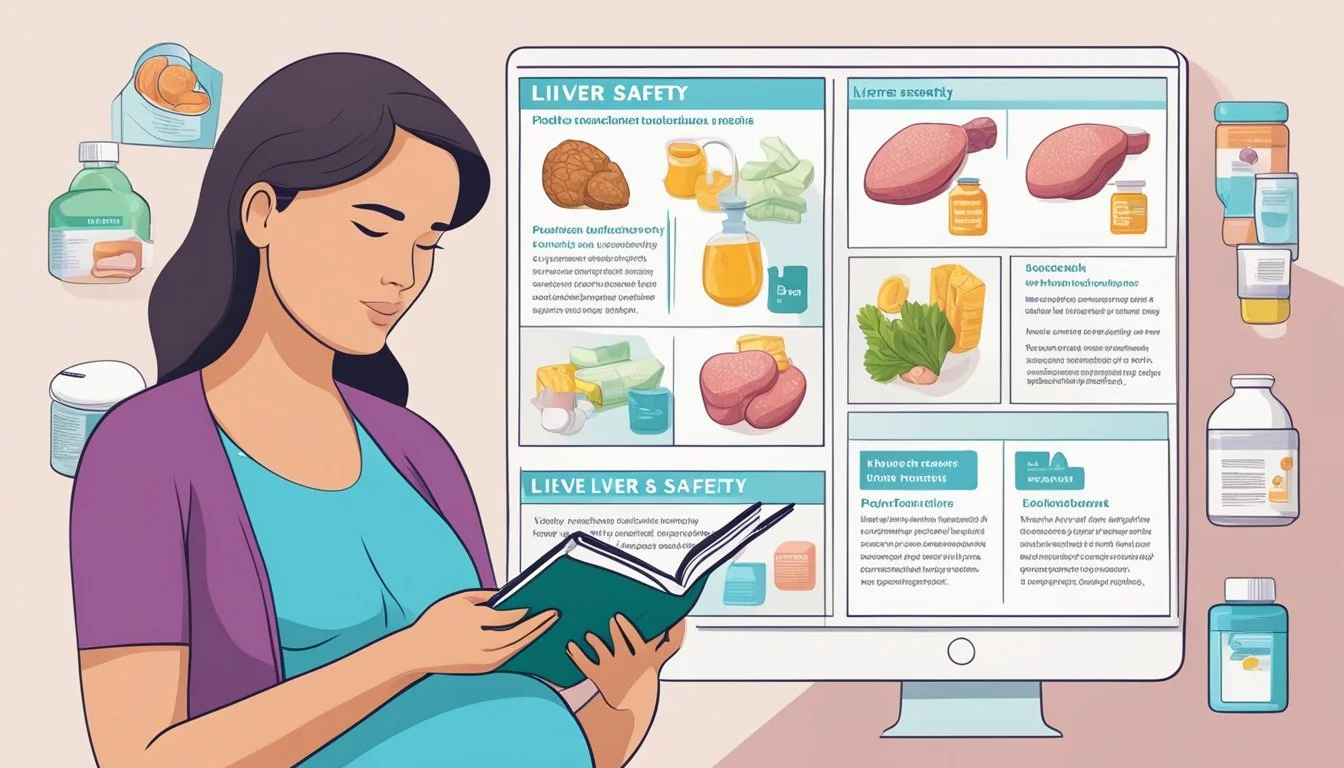Is Liver Safe to Eat While Pregnant?
Unveiling Nutritional Facts and Risks
Eating liver while pregnant raises important questions due to its high vitamin A content. Although vitamin A is essential for normal embryonic development, excessive intake can be harmful. Pregnant women need to be especially cautious, as high levels of vitamin A have been associated with birth defects. The liver is a rich source of this vitamin, thus prompting the concern. It is generally advised that pregnant women limit their consumption of liver to avoid the risk of vitamin A toxicity.
The debate surrounding the consumption of liver during pregnancy centers on striking a balance between necessary nutrients and potential risks. While liver is nutrient-dense, providing benefits such as a high iron content which can be beneficial during pregnancy, it's the vitamin A content that requires attention. Current guidelines suggest moderate intake, with some health authorities recommending that pregnant women eat no more than one serving of liver every two weeks to avoid an excessive intake.
Moreover, liver products also come with the risk of listeria infection, which is another factor that pregnant women must consider. The developing baby's health is of utmost concern, and dietary choices during pregnancy are made with the aim to support the unborn baby's growth without introducing unnecessary risks. Therefore, consulting healthcare providers for personalized dietary recommendations is a prudent step for any pregnant individual considering the inclusion of liver in their diet.
Nutritional Overview of Liver
Liver is recognized for its nutrient density, containing essential vitamins and minerals that play a critical role in bodily functions and development.
Vital Nutrients in Liver
Rich in vitamins and minerals, liver stands out among food sources for its concentration of vitamin A, iron, B vitamins (including B12 and folate), and copper. These nutrients are vital for various bodily functions such as vision, immune response, nervous system health, and skin maintenance. Specifically, beef and chicken liver are commonly cited for their high nutrient content.
Vitamin A: Crucial for eye health and development, immune function, and skin health
Iron: Integral for the transportation of oxygen in the blood
B Vitamins: Aid in energy production and the creation of red blood cells
Folate (B9): Essential for preventing neural tube defects during pregnancy
Copper: Supports iron absorption and helps maintain healthy bones, blood vessels, nerves, and immune function
Comparing Liver to Other Meats
Compared to other meats like beef, chicken, fish, and seafood, liver contains significantly higher levels of certain nutrients, particularly vitamin A and iron. For example, a 100-gram serving of beef liver contains approximately 1,049% of the Recommended Dietary Allowance (RDA) of vitamin A for adults, markedly more than the same serving of chicken breast or shrimp.
Nutrient Beef Liver (per 100g) Chicken Liver (per 100g) Beef (per 100g) Vitamin A 1,049% RDA 288% RDA 0% RDA Iron 6.2 mg 9 mg 2.6 mg Vitamin B12 3,460% RDA 1,000% RDA 157% RDA Folate 65% RDA 60% RDA 2% RDA
Benefits of Liver for Pregnant Women
Liver might be beneficial for pregnant women due to its high content of folate, iron, and other B vitamins, all of which are vital for the development of the fetus. Folate is known to reduce the risk of neural tube defects, while iron supports maternal increase in blood volume and prevents anemia. However, due to its very high vitamin A content, intake should be closely monitored to prevent potential toxicity and risk of birth defects.
Potential Risks of Liver Consumption During Pregnancy
Consuming liver during pregnancy can pose risks to the health of both the mother and the developing fetus due to its high content of preformed vitamin A and the potential presence of foodborne pathogens.
High Levels of Vitamin A and Retinol
Liver and liver products are rich sources of preformed vitamin A, also known as retinol. While vitamin A is essential for normal vision, the immune system, and reproduction, pregnant women are advised to be cautious about their intake as consuming high amounts of preformed vitamin A can lead to toxicity. This toxicity is particularly risky during pregnancy, as excessive amounts of vitamin A have been associated with birth defects. The recommended daily allowance for vitamin A during pregnancy should not be exceeded, and pregnant women should ensure they are not duplicating their intake through both their diet and prenatal vitamins.
Food Safety Concerns
The second major concern with the consumption of liver during pregnancy revolves around food safety. Liver can harbor infectious agents such as Salmonella and Listeria, which can be hazardous. Listeriosis, an infection caused by the Listeria bacteria, can be found in a variety of foods, including unpasteurized dairy products, soft cheeses, and undercooked meats. It poses a significant risk during pregnancy as it can lead to miscarriage, stillbirth, or severe illness in newborns. Pregnant women should ensure that any liver or liver products consumed are thoroughly cooked to reduce the risk of foodborne illnesses.
Guidelines for Liver and Liver Products
When considering the consumption of liver and liver products during pregnancy, it is crucial to be aware of the potential risks they pose due to high vitamin A content, which can be harmful in large quantities. It is advisable to seek professional advice from healthcare providers to ensure safety for both the mother and the fetus.
Safe Eating Practices
Pregnant women are advised to avoid liver, liver pâté, liver sausage, and similar liver products due to their high levels of vitamin A. Excessive vitamin A intake can lead to birth defects and other health issues. To minimize risk, expectant mothers should:
Consult with a doctor or dietitian: Before including liver in their diet, they should get personalized advice tailored to their nutritional needs.
Moderation: If consumption is considered safe, it should be in small amounts and infrequent to avoid surpassing the recommended vitamin A intake.
Read Labels: It’s essential to check labels of products like spreads and pâtés that may contain liver.
Alternatives and Supplements
Since liver and liver products are typically avoided, pregnant women can obtain necessary nutrients from other sources. A balanced approach includes:
Prenatal Vitamin: A multivitamin designed for pregnancy can compensate for the lack of certain nutrients due to dietary limitations.
Beta-Carotene Sources: Alternatives rich in beta-carotene, a safer form of vitamin A, include sweet potatoes, carrots, and dark leafy greens.
Omega-3 Supplements: Instead of cod liver oil or fish oil, which may contain high levels of vitamin A, expectant mothers can consider omega-3 supplements recommended by their healthcare provider after assessing their dietary needs.
Incorporating these practices ensures pregnant women receive the nutrients they need while minimizing risk.
Incorporating Liver into a Pregnancy Diet
When considering liver for a pregnancy diet, it's crucial to balance the potential nutritional benefits with guidelines to ensure safe consumption levels. Following recipes that incorporate vegetables and safe preparation methods can enhance both the flavor and nutritional value of liver.
Recipes and Preparation Tips
Liver can be prepared in various ways that make it palatable during pregnancy. Here are some tips to safely include liver in a diet:
Pair with Vegetables: Combine cooked liver with an array of vegetables like broccoli and carrots to create a balanced meal.
Salads: Add small amounts of liver to salads for a nutrient-rich topping.
Cooking Methods: Opt for cooking methods such as grilling or broiling to avoid adding excess fats.
Serving Size and Frequency Recommendations
Due to its high Vitamin A content, liver consumption should be moderated during pregnancy. Here are specific guidelines for safe intake:
Serving Size: Consume no more than a 2-ounce serving of liver.
Frequency: Limit intake to once or twice a month to manage Vitamin A levels.
Expectant mothers should always consult with their doctor, dietitian, or nutritionist before making any dietary changes to ensure they are meeting their unique nutritional needs during pregnancy.
Consulting Healthcare Providers
During pregnancy, it's essential to engage with healthcare providers to ensure a diet that's safe and nutritious both for the mother and the developing baby. This section focuses on the importance of consulting doctors or midwives regarding liver consumption and the use of supplements.
When to Talk to Your Doctor
Pregnant women should immediately consult their doctor or midwife if they have a history of liver disease or experience abnormal liver tests during pregnancy. Symptoms such as abdominal pain, nausea, vomiting, and jaundice are also prompt reasons to reach out to a healthcare professional. It's vital to discuss the safety of eating liver while pregnant, as it contains high levels of vitamin A, which can be harmful in excess.
Discussing Supplements and Dietary Needs
When considering supplements like cod liver oil or omega-3 fatty acids, pregnant women must talk with their healthcare provider to tailor supplement use to their specific dietary needs. It's generally recommended to rely on a prenatal vitamin that includes essential nutrients such as B vitamins and folic acid, rather than consuming liver which could lead to vitamin A overconsumption. For omega-3 fatty acids, which are crucial for fetal development, a healthcare provider or pharmacist can recommend a safe and appropriate supplement if necessary. Always ensure supplements are from reliable sources and discuss the use of any multivitamin or mineral supplements with a professional to maintain a balanced intake.
Conclusion
Consuming liver during pregnancy can have both benefits and risks. Liver is rich in essential nutrients, offering a valuable source of iron which is crucial for the development of the fetus and health of the mother. However, the core concern surrounding liver intake lies in its high vitamin A content. Excessive vitamin A during pregnancy, particularly in the form of retinol found in liver, has been associated with birth defects.
Pregnant individuals must consult with their healthcare provider before incorporating liver into their diet. Moderation is key, as limited consumption may not pose a significant risk and can contribute to a balanced diet.
It's also prudent to consider diverse food sources to attain a proper mix of nutrients. Beta-carotene, the plant-based precursor to vitamin A, is found in vegetables such as carrots and sweet potatoes and is a safer option for meeting the vitamin A requirements because the body converts it to vitamin A only as needed.
Nutrient Alternatives for Liver:
Iron: Spinach, lentils, and fortified cereals
Vitamin A: Carrots, sweet potatoes, and kale (as beta-carotene)
Omega-3 Fatty Acids: Flaxseeds, walnuts, and certified omega-3 supplements
The healthcare provider may also recommend a suitable omega-3 supplement as an alternative to cod liver oil to avoid the risks associated with high vitamin A intake.
As a safety precaution, it's imperative for expectant mothers to seek personalized advice from their healthcare provider in order to optimize prenatal nutritional intake while guarding the well-being of both mother and child.





